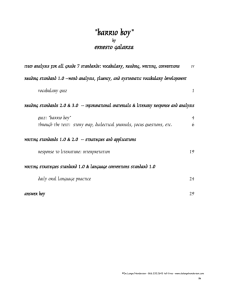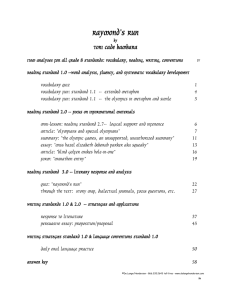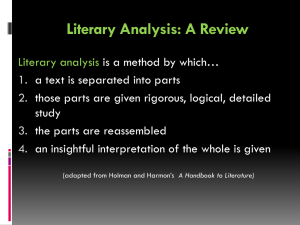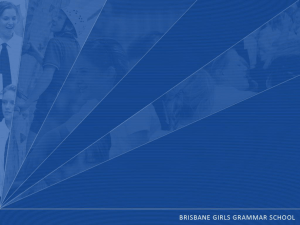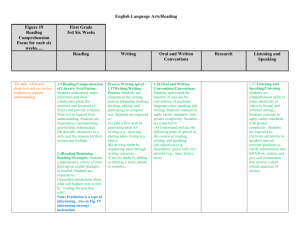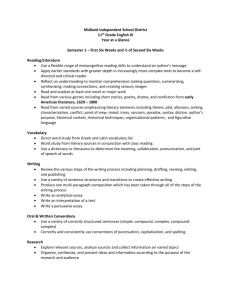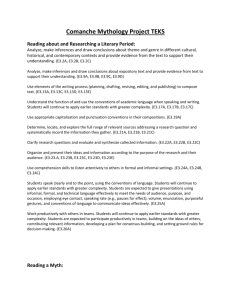ELA Grade 3 Module 7
advertisement
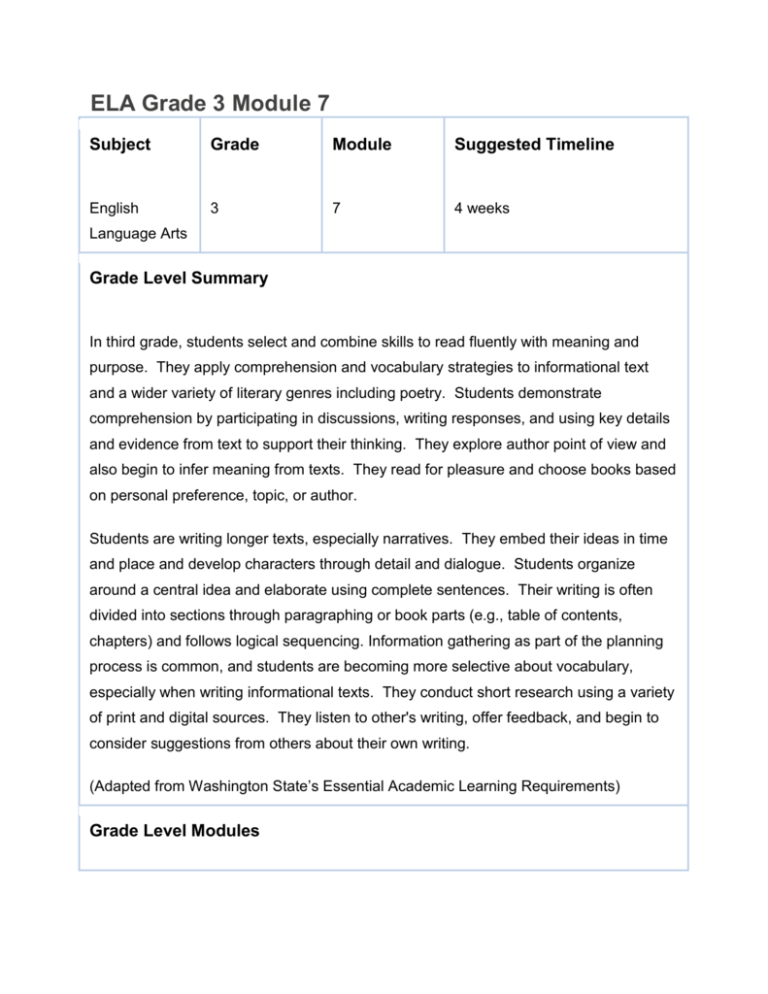
ELA Grade 3 Module 7 Subject Grade Module Suggested Timeline English 3 7 4 weeks Language Arts Grade Level Summary In third grade, students select and combine skills to read fluently with meaning and purpose. They apply comprehension and vocabulary strategies to informational text and a wider variety of literary genres including poetry. Students demonstrate comprehension by participating in discussions, writing responses, and using key details and evidence from text to support their thinking. They explore author point of view and also begin to infer meaning from texts. They read for pleasure and choose books based on personal preference, topic, or author. Students are writing longer texts, especially narratives. They embed their ideas in time and place and develop characters through detail and dialogue. Students organize around a central idea and elaborate using complete sentences. Their writing is often divided into sections through paragraphing or book parts (e.g., table of contents, chapters) and follows logical sequencing. Information gathering as part of the planning process is common, and students are becoming more selective about vocabulary, especially when writing informational texts. They conduct short research using a variety of print and digital sources. They listen to other's writing, offer feedback, and begin to consider suggestions from others about their own writing. (Adapted from Washington State’s Essential Academic Learning Requirements) Grade Level Modules Module 1: Becoming a Close Reader and Writing to Learn Module 2: Researching to Build Knowledge and Teaching Others (emphasis on narrative text types and writing) Module 3: Researching to Build Knowledge and Teaching Others (emphasis on informational text types and writing) Module 4: Considering Perspectives and Supporting Opinions (emphasis on opinion writing comparing texts) Module 5: Considering Perspectives and Supporting Opinions (emphasis on opinion writing explaining with textual reasons) Module 6: Gathering Evidence and Speaking to Others Module 7: Literary Analysis Module Title Module 7:Literary Analysis Module Overview In this module, students will participate in literary analysis while reading various narrative pieces including fables, myths, and legends. They will focus on determining the central message, lesson, or moral in literary text and explain how it is conveyed in text. Students will have opportunities to write narratives, such as a fable, to further develop real or imagined experiences or events while demonstrating command of the conventions of standards English grammar and spelling. To build fluency, they will participate in Readers Theater and read aloud a narrative play. Academic vocabulary is filtered throughout the module where students are given multiple opportunities to engage in discussions. Module Objectives At the end of this module, students will be able to independently use their learning to: Determine the central message, lesson, or moral in literary text, explaining how it is conveyed in text along with the point of view of the author. Ask/answer questions while making inferences and refering to the text to support their responses. Write narratives to develop real or imagined expereinces or events while using dialogue and descriptions of actions, thoughts, and feelings. Demonstrate command of the conventions of standard English grammar and spelling when writing and speaking. Focus Standards Addressed in this Module CC.1.3.3.A - Determine the central message, lesson, or moral in literary text; explain how it is conveyed in text. CC.1.3.3.B - Ask and answer questions about the text and make inferences from text; refer to text to support responses. CC.1.3.3.D - Explain the point of view of the author. CC.1.3.3.F - Determine the meaning of words and phrases as they are used in grade level text, distinguishing literal from non-literal meaning as well as shades of meaning among related words. CC.1.4.3.M - Write narratives to develop real or imagined experiences or events. CC.1.4.3.O - Use dialogue and descriptions of actions, thoughts, and feelings to develop experiences and events or show the response of characters to situations. CC.1.4.3.R - Demonstrate a grade appropriate command of the conventions of standard English grammar and spelling CC.1.5.3.G - Demonstrate command of the conventions of standard English when speaking based on grade 3 level and content. Important Standards Addressed in this Module CC.1.2.3.E - Use text features and search tools to locate and interpret information. Misconceptions Proper Conceptions In Readers Theater is only for small Readers Theater is for any age and children or for those with extensive reading ability. Possible scripts exist in theatrical experience. Students must any material used in the classroom, and memorize their parts, scripts are difficult that these scripts may quickly be to find and adapt, and a great deal of adapted by the students and performed time and preparation are required for soon afterwards. Readers Theater is not this instructional technique. limited to those students with a high level of speaking proficiency; instead, students of all levels can participate in this activity which can involve the entire class. Concepts Competencies Vocabulary Point of View Vocabulary Ask and answer questions about the text and make inferences from text; refer to text to support responses. Point of view Text Analysis Explain the point of view of the author. Focus for Writing Determine the meaning of words and phrases as they are used in grade level text, distinguishing literal from non-literal meaning as well as shades of meaning Writing Conventions Connotation among related words. Evaluating Information Conventions of Standard English Denotation Describe characters in a story and explain how their actions contribute to the sequence of events. Informational: Identify and introduce the topic. Opinion: Introduce the topic and state an opinion on the topic. Narrative: Establish a situation and introduce a narrator and/or characters. Demonstrate a grade appropriate command of the conventions of standard English grammar, usage, capitalization, punctuation, and spelling. Demonstrate command of the conventions of standard English when speaking based on grade 3 level and content. Literal Non-literal Convey Literary Infer Inferences Support Abstract nouns Regular verbs Irregular verbs Antecedents Comparative adjectives Superlative adjectives Coordinating conjunctions Subordinate conjunctions Simple sentences Compound sentences Complex sentences
